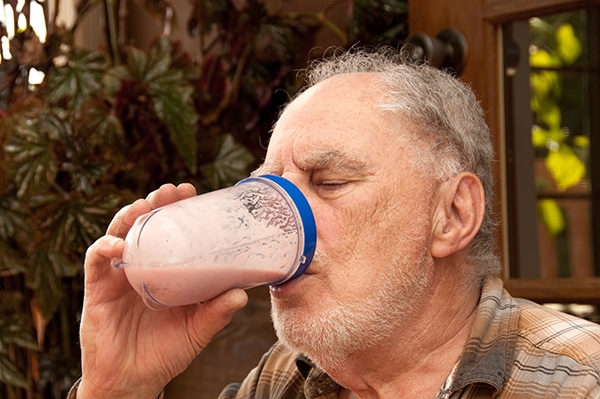In mixed patient groups oral nutritional supplements (ONS), sometimes referred to as sip feeds, have been shown to be effective in improving weight status. But do we know whether this is true specifically in people with dementia? Can ONS in this group of service users lead to an improvement in weight and therefore be helpful in the prevention and treatment of malnutrition? This is the subject of a recent article in Network Health Digest that suggests particular consideration should be given to people with dementia when prescribed supplements.
Supplements Can Only Be Effective If Consumed
Clearly, ONS can only be effective if consumed, and although short-term compliance in people with dementia has been reported to be satisfactory, figures as low as 8.5% have been reported in longer-term trials. In addition, the high dropout rates in some ONS studies, which may have introduced considerable bias, have led to some questioning of the effectiveness of ONS for people with dementia at risk of, or with, malnutrition.
In addition, ONS are often prescribed on the basis of weight loss or low BMI, yet in people with dementia, some of the most important factors associated with increased risk of malnutrition relate to eating ability. If the reason for individuals’ weight loss is related to their ability to feed themselves, then providing additional ONS without supporting their eating and drinking abilities is unlikely to lead to an increased intake. This reinforces the need to not only screen for risk of malnutrition, but to adequately assess individual nutrition needs, including the assistance required with eating as part of the prescription decision.
Monitor to See How Supplements Impact On Food Intake At Mealtimes
There is also some evidence suggesting that people with dementia and with a low BMI decrease their oral dietary intake when prescribed ONS, and may, therefore, decrease overall intake and continue to lose weight. Consideration as to how ONS affects oral intake at subsequent meals is key. It is worth noting that people with dementia who have a low BMI are more likely to have later stage dementia and are also more likely to have reduced mealtime abilities.
Although there is individual variation, the most desirable and effective regimen in terms of dose and timing has not been established. In general, people with dementia are less likely to suffer a decrease in appetite if ONS are provided at small regular intervals and between meals. Furthermore, in mixed patient groups, research indicates that providing ONS with higher calorie content, lower volume and with an increased variety of flavours may be useful in increasing compliance, and this may well be applicable to increasing compliance in people with dementia. Monitoring is also important. One way of monitoring that has been shown to be useful is a two-day trial of ONS alongside a detailed recording of oral food intake.
ONS May Be Helpful, But Should Not Be A Meal Replacement
For someone living with dementia where mealtimes will be one of their few opportunities for social interactions, a decrease in food intake is unwanted from both a nutritional and quality-of-life aspect. Fundamentally ONS should be a supplement to the diet and not become a meal replacement. Providing assistance with eating and drinking can be seen as a labour-intensive, caring task and be problematic in instances of inadequate staffing levels. ONS may be helpful, but strategies to improve mealtime abilities and eating environments to promote food intake should not be ignored when they are prescribed.







